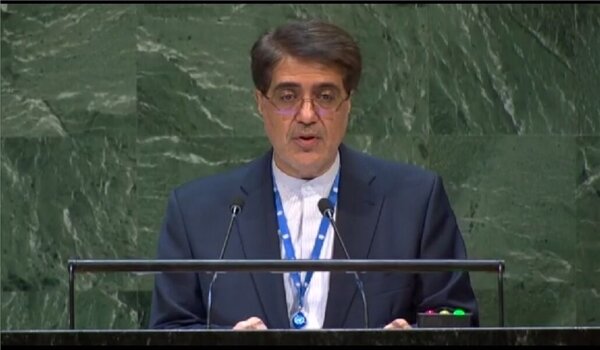Envoy: coercive sanctions obstructing regional, international peace

Iran's first counselor to the United Nations has said unilateral sanctions, use of force and coercion and disrespect for the international law are seriously threatening regional and global peace.
"In fact, unilaterally imposed measures, the use and threat of use of force, and unilateral coercive sanctions as a means to achieving national policy objectives have a seriously adverse impact on the promotion of peace at the regional and international level," Farhad Mamdouhi said, addressing the United Nations High-Level Forum on the Culture of Peace on Friday.
He added that such destructive measures are “fundamental impediments to establishing a peaceful and prosperous world as well as a just and equitable international order, which is a vital prerequisite for sustainable development”.
He regretted that “the world’s democratic principles and international laws are increasingly and flagrantly ignored”.
“The rule of law is being severely and constantly undermined,” he voiced concern over unilateral moves, indirectly referring to the policies of U.S. President Donald Trump.
Here comes the full text of his address:
Madam President,
Allow me first to commend you for giving special attention to the observance of the twentieth anniversary of the adoption of the pertinent Declaration and Programme of Action through the convening of this high-level Forum. This important meeting on the urgent need to promote, defend and strengthen peace provides us with an opportunity to renew our commitment to further strengthen global movement for the culture of peace.
In this regard, I wish to take this opportunity to briefly highlight a number of issues of particular importance.
Madam President,
Today, the world’s democratic principles and international laws are increasingly and flagrantly ignored. The rule of law is being severely and constantly undermined. We are witnessing that the current global situation presents great challenges to peace. Existing and emerging threats at the international and regional level continue to impede efforts by States to promote peace and security, which is the cornerstone for the empowerment of humanity based on sustainable development.
One of these major threats is the growing resort to unilateralism.
In fact, unilaterally imposed measures, the use and threat of use of force, and unilateral coercive sanctions as a means to achieving national policy objectives have a seriously adverse impact on the promotion of peace at the regional and international level. They are fundamental impediments to establishing a peaceful and prosperous world as well as a just and equitable international order, which is a vital prerequisite for sustainable development.
The rising threat of terrorism and violent extremism across the globe, in particular in the Middle East, is a result of one of the symptoms of unilateralism coupled with interventionist, flawed and short-sighted policies.
Withdrawing from international organizations, especially UNESCO and the Human Rights Council as well as international agreements such as the Paris Agreement, are among some examples of a “me first”, self-centered and arrogant policy that stems from unilateralism.
Threatening states’ sovereignty and independence as well as their freedom of trade and investment while also preventing them from exercising their right to decide, by their own free will, their own political, economic and social systems, are among some of the significant obstacles to the “development” of targeted States, let alone their “sustainable development”.
In this respect, challenges to peace must be directly addressed at their root causes. Sustainable peace cannot be brought on by a “self-centered” and “me first” approach, which is principally in contradiction of culture of peace.
Therefore, in order to secure peace and provide sound foundation for its development, there needs to be a shift towards a new democratic and balanced approach.
Peace and security could be promoted based on the collective contribution and cooperation of states on equal footing. This can be achieved by simply recognizing the need to respect the interests of all States, which by its very nature will lead to stability. Unless there is a collective effort to bring inclusive peace and security to the world, we will be engulfed in turmoil and potentially far worse for generations to come.
We need to resolutely address the phenomenon of “extremist unilateralism” by promoting and reinforcing multilateralism with an inclusive multilateral decision-making process based on high ethical values and cooperation.
We need to play an active part to promote and defend multilateralism as the appropriate framework to provide sustainable methods to resolve existing challenges.
(Source: FNA)
Leave a Comment